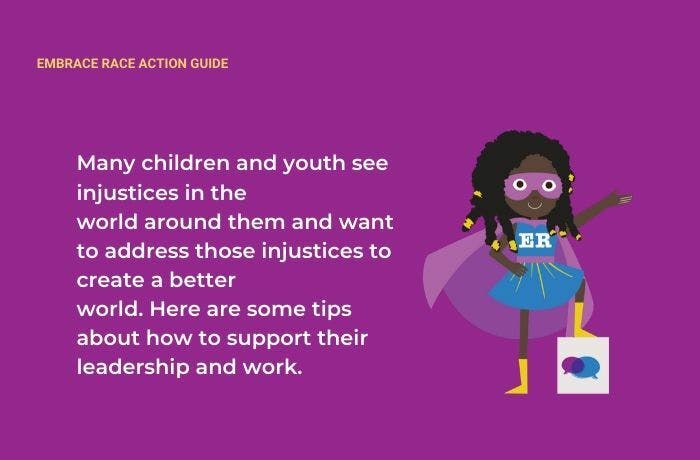7 ways to support the young activists in your life!

Many children and youth see injustices in the world around them and want to address those injustices to create a better world. And they are doing so in a whole variety of ways, from protest to policy advocacy to educating themselves and their peers on social media. As parents, teachers, and other adults with relationships to young activists, we can help or hinder their efforts. Here are some tips about how to support their leadership and work.
1. Question your own assumptions
We live in an adultist society in which we are bombarded with messages that young people are less informed, more emotional, and less capable of independent critical thinking than adults are. As adults, we need to unlearn these misconceptions and question our tendencies to see ourselves as the experts and youth as just students or “future leaders.” Read about ageism, about the history of youth organizing, and how the meaning of childhood and youth has varied in different times and places.
2. Be ready to learn
Young people have direct experiences, complex critical analyses, and important political strategies that they can share. Adults need to really hear what young people are saying and can learn from what they are doing. Their visions, tactics, and modes of interaction can and should expand our own understandings of the world around us.
3. Offer resources
Adults have particular material and social resources that often are harder for young people to access. We can provide financial support, introduce youth to key decision-makers or influential members of our communities, give them rides, cook meals, and offer our conference rooms, living rooms, or classrooms for their meetings.
4. Provide institutional memory and continuity
Young people move through institutions, especially schools, much more quickly than most adults do. Adults can provide important information about what previous cohorts of youth have done and how institutions have responded in the past. This can be especially important when institutions have made commitments that are not being fulfilled.
5. Offer supportive labor
Young people want our active engagement and support; activism can be exhausting! Adults can provide encouragement and care, including listening to young people’s frustrations and showing that their feelings and experiences matter to us. We can also offer material labor, from printing fliers to screening their social media accounts for harassment and trolling.
6. Don’t talk too much or take the lead (check yourself)
Because of our age-based power and privilege, adults are often too quick to answer questions, give our opinions, and control the conversation in intergenerational activist spaces. We need to step back and give young people room to develop and articulate their own positions.
7. Connect them to each other
Our institutional positions are often ones that allow us to connect youth to each other. As teachers, we may be able to help youth activists at one school find those at another through our relationships with other teachers. As parents and community members, we may be able to connect youth activists in our lives with other organizations and groups. Young activists are great at finding one another on social media, but we may have complementary contacts that can help strengthen their connections outside of their normal social circles.
Jessica Taft



